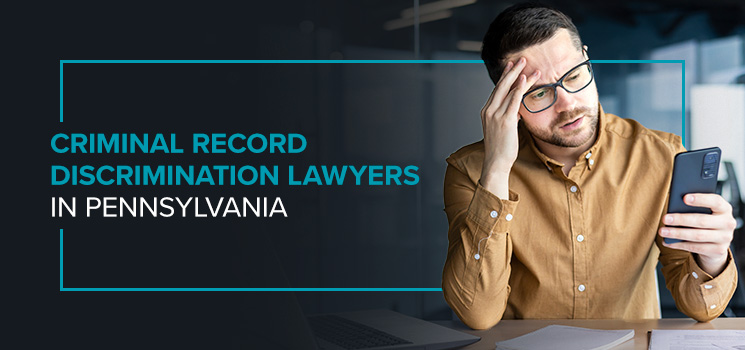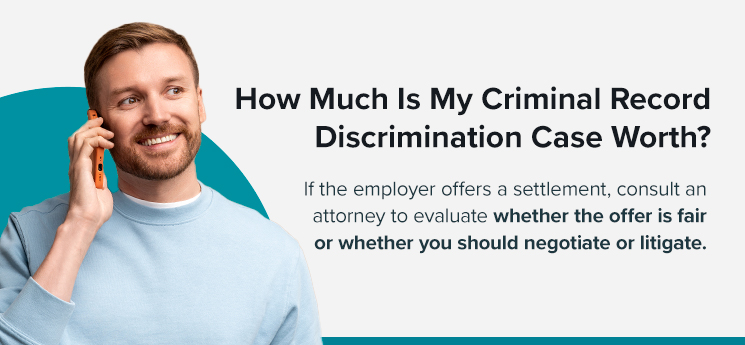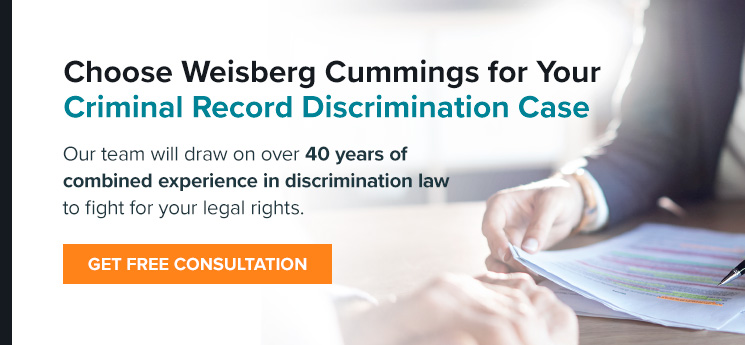After completing the requirements of your prison or jail sentence, your next action is often seeking employment. Some states and cities have laws allowing employers to ask about criminal history or run criminal background checks. These inquiries can make it challenging to get gainful employment, especially if there is substantial competition for a job.
Employers can conduct pre-employment screenings and background checks in many locations that ask sensitive questions concerning your criminal record. However, in Pennsylvania and at the federal level, laws forbid such information from being used as a discriminatory employment practice.
What Criminal Record Discrimination Laws Apply in Pennsylvania?
Many claims of criminal record discrimination fall under the applications of Title VII of the Civil Rights Act of 1964. Generally speaking, it is unlawful for an employer to use criminal history as a basis of employment decisions if:
- The applicant’s criminal record is irrelevant to the job requirements, such as the ability to get a security clearance, and
- The employer’s recruitment decisions adversely impact one population group with protected characteristics, such as race or gender.
Title VII primarily applies to labor organizations, employment agencies and entities with 15 or more employees, with some exemptions for private associations or religious groups. Additionally, the Pennsylvania Human Relations Act provides similar protections for employees of Pennsylvania companies with as few as four employees.
In Pennsylvania, the Criminal History Record Information Act (CHRIA) also limits an employer’s right to use information from a criminal background report for recruitment decisions. The act allows employers to use this information only when it includes felony and misdemeanor convictions and to the extent that those convictions relate to the applicant’s suitability for the job. The law further provides that an employer must notify you in writing if your criminal history has influenced their decision to reject your application.
Several cities place further legal restrictions on how and when employers can use charges and convictions as part of their hiring and termination processes. For example, Philadelphia’s Fair Chance Hiring law only allows employers to conduct a criminal background check after making a conditional employment offer. This background check may not consider convictions older than the last seven years.
Can I Sue for a Wrongful Background Check?
You may have grounds for a lawsuit if an employer:
- Rejects your application because of a conviction irrelevant to your suitability for the job.
- Rejects your application based on a conviction while accepting applicants of a different race or gender with similar records.
- Goes further back into your criminal history than is allowed in your location.
- Asks about or checks your criminal record earlier in the process than is allowed in your location.
- Refuses to give you a copy of the criminal background check report that influenced their hiring decision about you.
- Fails to meet Fair Credit Reporting Act (FCRA) standards in handling your sensitive information.
- Rejects your employment based on false information a background check company claims about you.
Contacting a qualified lawyer for background check violations is the most effective route you can take to get advice on your claims and next steps.
How Much Is My Criminal Record Discrimination Case Worth?
How much each criminal record discrimination case is worth depends on several factors, such as:
- Whether the employer offers to settle out of court or is willing to dispute your claim in court.
- Whether and how far you are willing to pursue litigation against the employer.
- The damages the discrimination caused you, such as missing out on months of a salary you are qualified to earn.
- The employer’s size and financial capacity to pay damages.
- Whether the employer has a history of discrimination claims against them.
- How strong the evidence for your case is.
If the employer offers a settlement, consult an attorney to evaluate whether the offer is fair or whether you should negotiate or litigate. An experienced discrimination attorney can also negotiate settlements on your behalf to help get you the most favorable outcome. Settlement amounts vary broadly.
If the case goes to court and you win, the total amount the court awards may include:
- Actual damages: The court may require the employer to compensate you for damages like lost wages and psychological distress. The amount must be at least $100 per violation, according to the CHRIA.
- Punitive damages: If the discrimination was intentional, the court may require the employer to pay a further $1,000-$10,000 as a punishment and to set an example.
- Legal costs: Winning an employment discrimination case usually results in the employer having to reimburse your attorney’s fees. This award compensates you for your legal expenses and incentivizes you to hire a qualified lawyer for your background check discrimination lawsuit.
Advantages of Working With a Criminal Record Discrimination Lawyer
When you partner with an employment law attorney, your case gets the time and attention it deserves. Meanwhile, a dedicated employment discrimination attorney can offer you:
- Knowledge: Lawyers specializing in employment law have a more in-depth understanding of its challenges and nuances. They rely on their expertise to help you navigate the system and work for the outcome you deserve.
- Support: Working with an attorney sensitive to your unique needs fosters comfort and trust. You can have peace of mind knowing your legal professional understands the impact of your situation.
- Experience: A seasoned attorney is well-practiced in evaluating claims, gathering evidence and advocating for their clients. Having their experience in your corner can help uphold your legal rights in the face of discrimination.
Choose Weisberg Cummings for Your Criminal Record Discrimination Case
Having an experienced litigation attorney on your side can make all the difference in filing a successful criminal record discrimination complaint. If you’ve experienced discrimination based on past charges or convictions, you can trust the professionals at Weisberg Cummings for the legal representation and advocacy you deserve. Our team will draw on over 40 years of combined experience in discrimination law to fight for your legal rights.
Contact us today to request your free consultation.



